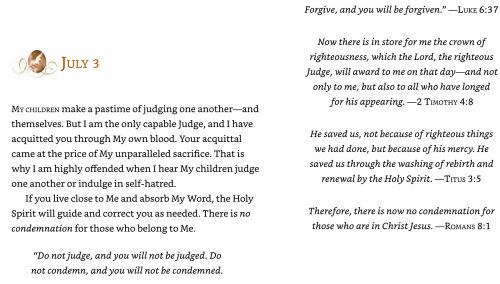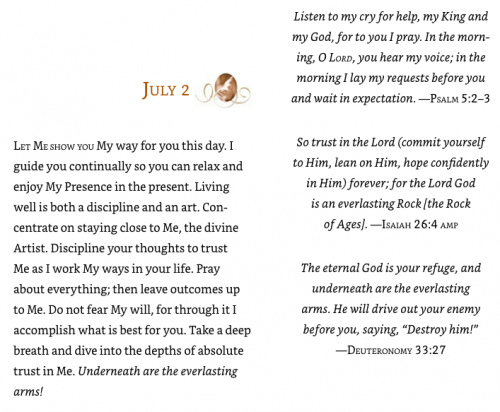Sustained in God’s Love
Monday, July 6, 2020
Wisdom in Times of Crisis
In the light of eternity, we’re here for a very short time, really. We’re here for one thing, ultimately: to learn how to love, because God is love. Love is our origin, love is our ground, and love is our destiny. —James Finley
CAC faculty member James Finley offers a contemplative practice to help us experience the love of God even in the midst of chaos. Living out of that love transforms both ourselves and the world.
What is the practice that matters now? A practice is any act habitually entered into with our whole heart that takes us to the deeper place. Some of these practices, we might not think of as prayer and meditation: tending the roses, a long, slow walk to no place in particular, a quiet moment at day’s end, being vulnerable in the presence of that person in whose presence we’re taken to the deeper place, the pause between two lines of a poem. There are these acts that reground us in the depth dimensions of our life that matter most; so if we’re faithful to our practice, our practice will be faithful to us. . . .
In this contemplative practice, sit and renew your awareness that you’re sitting in the presence of God all about you and within you. As you inhale, inhale God’s silent “I love you,” in which God is being poured out and utterly given away to you as the miracle of your very life. Then when you exhale, exhale yourself in love: “I love you.” And so, we are breathing [along with God], “I love you. I love you. I love you. I love you.” From the reciprocity of love, destiny is fulfilled, and the foundations of suffering are healed.
As we sit this way, suffering arises. The suffering then might be our anxiety and concerns today, for ourselves, for our loved ones, for the world. As we sit in the midst of the arising of the anxiety, when we inhale, we inhale this love of God loving us through and through, anxiety and all, finding no hindrance in our anxiety, loving us so unexplainably forever. Then when we exhale, we exhale ourselves in love, anxiety and all, to the love that loves us. This requires gentle perseverance, because anxiety arises again. It doesn’t automatically go away. We sit with it, we lean into it again, and we hold fast to this love that sustains us in the midst of things. It is in this way, little by little, that we come to understand the unsubstantiality of everything but love. Love and love alone has the authority to name who we are.
This practice, then, experientially grounds us in this love wisdom. This love wisdom—grounded in practice—empowers us to go out and share this with other people in the circumstances in which we find ourselves.
Wisdom in Times of Crisis
Change
Is Inevitable
Sunday, July 5, 2020
The word change normally refers to new beginnings. But the mystery of transformation more often happens not when something new begins, but when something old falls apart. The pain of something old falling apart—chaos—invites the soul to listen at a deeper level, and sometimes forces the soul to go to a new place. Most of us would never go to new places in any other way. The mystics use many words to describe this chaos: fire, dark night, death, emptiness, abandonment, trial, the Evil One. Whatever it is, it does not feel good and it does not feel like God.
We will normally do anything to keep the old thing from falling apart, yet this is when we need patience and guidance, and the freedom to let go instead of tightening our controls and certitudes. Perhaps Jesus is describing just this phenomenon when he says, “It is a narrow gate and a hard road that leads to life, and only a few find it” (Matthew 7:14). Not accidentally, he mentions this narrow road right after teaching the Golden Rule. He knows how much letting go it takes to “treat others as you would like them to treat you” (Matthew 7:12).
While change can force a transformation, spiritual transformation always includes a disconcerting reorientation. It can either help people to find new meaning or it can force people to close down and slowly turn bitter. The difference is determined precisely by the quality of our inner life, our practices, and our spirituality. Change happens, but transformation is always a process of letting go, living in the confusing, shadowy space for a while. Eventually, we are spit up on a new and unexpected shore. You can see why Jonah in the belly of the whale is such an important symbol for many Jews and Christians.
In moments of insecurity and crisis, shoulds and oughts don’t really help. They just increase the shame, guilt, pressure, and likelihood of backsliding into unhealthy patterns. It’s the deep yeses that carry us through to the other side. It’s that deeper something we are strongly for—such as equality and dignity for all—that allows us to wait it out. It’s someone in whom we absolutely believe and to whom we commit. In plain language, love wins out over guilt any day.
At the Center for Action and Contemplation, we are blessed with a core faculty that comes from a variety of backgrounds and life experiences. We are from northern and southern States, the Midwest and the coasts, celibate and married, male and female, Black and white, Protestant and Catholic. Each of us speaks out of our commitment to practices of spiritual transformation drawn from the Christian contemplative tradition. This week I want to share some wisdom for times of crisis from these friends and teaching colleagues: Cynthia Bourgeault, James Finley, Barbara Holmes, and Brian McLaren. I hope they can serve as guides to your own internal yes to love.

